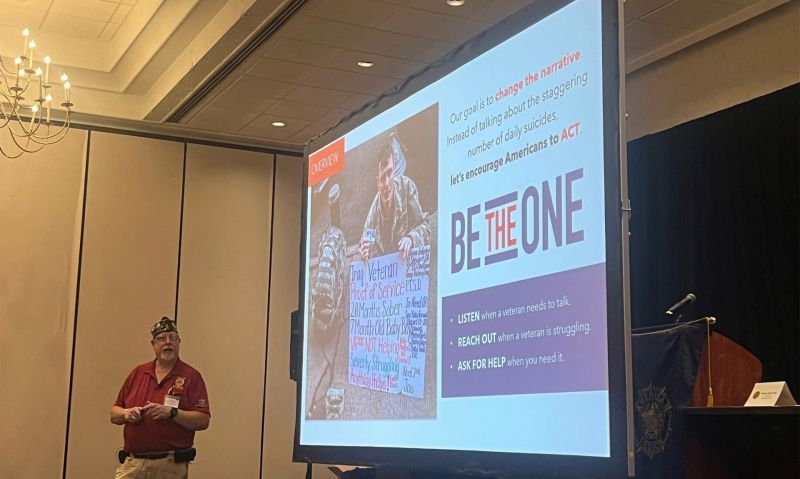
Department of Illinois membership chairman shares how to save the life of a veteran in crisis by being their advocate.
If you could save the life of a veteran by doing one thing, what would it be?
“Listening. People want to be heard and validated,” said Jim Talaska, Department of Illinois membership director, to attendees of the National Membership Workshop in Indianapolis Friday, July 28. “That veteran that is attempting or thinking about suicide wants to be heard. You’ve got to show them that you care about them.”
Talaska said that if you ask a veteran, who you know is going through a hard time, how they are and they say fine, “don’t take that at face value. Press a little bit. Offer the open door. ‘Hey, I understand you might be going through some stuff. I’m just letting you know that I’m here. Here’s my phone number; let’s go for a cup of coffee. Help me out. Talk to me. I’m not a mental health professional, but I’ll find you help. I can make phone calls; I can figure it out.’ You have to be the advocate.”
The American Legion’s Be the One suicide prevention initiative is aimed destigmatizing the need for veterans to ask for help. “It takes courage and strength of a warrior to ask for help,” Talaska said of the Department of Veteran Affairs slogan. “There’s nobody sitting in this room that will willingly ask for help because we want to do it ourselves. That’s what we’re trained for. It takes strength and courage to reach out and ask for help.”
The Be the One initiative is also about changing the narrative – instead of talking about the number of veteran suicides, act to save lives. Be the One to:
· Listen when a veteran needs to talk.
· Reach out when a veteran is struggling.
· Ask for help when you need it.
The road to ending veteran suicide starts by “saving one life,” Talaska said. “I had a veteran that I was dealing with that was coping, was kind of doing OK. He had a dog that was his whole life. The dog was 13; the dog passed away. That was his whole world and he had nothing left to live for. Until we got him some help and showed him that he had something else to live for, he had something else to offer.”
Talaska provided the following tips to help Be the One.
Listen for nonverbal signs:
· Putting personal affairs in order outside normal times.
· Engaging in self-destructive behavior.
· Planning to “get away” alone with no return plans.
· Stops normal socializing activities.
· Unexplained personality changes.
Listen to what might be said:
· I’m tired.
· I’m exhausted.
· It would be better if I wasn’t here.
· I’m going to kill myself.
· I’d rather be dead.
· No one would miss me.
Find help:
· Connect veterans with resources.
· Stay with the veteran until they are connected to help.
· Follow up with the veteran.
Reach out:
· We are family, I am here with you. And stay with the veteran until they are connected to help. “When you’re talking to that veteran, that’s my family, and I want to protect them just like I would my child,” Talaska said. “Because if I don’t, I’m not helping them. It’s one thing to take them to the hospital and say I did what I needed to do and walk away. Your job isn’t done because you wouldn’t do that to your family. Don’t do it to anybody else.”
· Ask what is something we can look forward to? “Maybe that person likes to hunt, likes to fish … whatever it is, give them a reason to want to look toward the future. Give them a purpose. What is it that we can do?”
· Say to the veteran, “I may not be able to understand everything right now but we can work through this. We can figure this out, together. You’re not in this by yourself.”
Ask the hard questions:
· Are you thinking about killing yourself?
· Are you considering suicide?
“When we talk about Be the One, and we talk about it’s personal, I’m not a mental health person, but you need to be the one to say, ‘look, I know you’re going through a rough time, do me a favor. Give me 15 minutes, give me a half hour. I’m going to get you help. Give me one more day. Just hang on; give me a little bit more time. And we can work through this.’ You have to be the advocate.”
Talaska encouraged those who encounter a veteran in crisis, especially one who says they are worthless or that no one cares if they are here, to say the well-known Dr. Seuss quote, “’To the world you may be one person; but to one person you may be the world.’ That is going to make them stop and think, maybe somebody really does care that I’m here still.”
- Be the One

